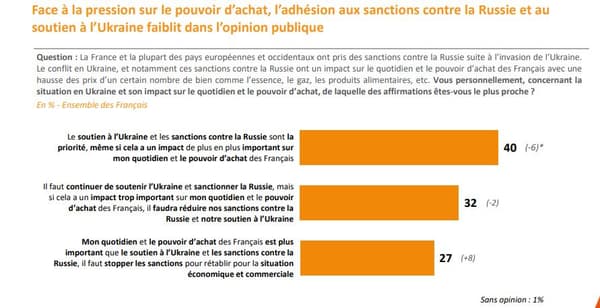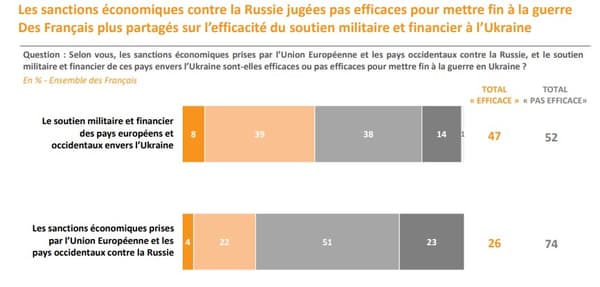The teaching of our new survey “L’Opinion en direct” delivered by Elabe this Wednesday is almost paradoxical. The French still approve of economic sanctions against Russia, as well as military and financial support for Ukraine, but they basically no longer believe in them.
Indeed, if 72% of the French continue to defend the cause of the sanctions decreed against the invader and aid to Ukraine, also 74% and 52%, respectively, consider that the sanctions and this alliance are not effective.
Adherence to sanctions full of nuances
Adherence to the package of economic sanctions is also to varying degrees. Thus, 40% (six points below a previous measurement of March 24) of our fellow citizens believe that “support for Ukraine and sanctions against Russia are the priority, even if this has a greater and more important impact on their daily life and buying power of the French”, according to the editorial office of the electoral institute. 32% (after a two-point drop) rate: “We must continue to support Ukraine and sanction Russia, but if this has too great an impact on their daily lives and on the purchasing power of the French, we will have to reduce our sanctions”. against Russia and our support for Ukraine.
Finally, 27% of those surveyed – certainly a minority share, but a sharp increase of eight points – postulate instead “that the daily life and purchasing power of the French are more important than support for Ukraine and sanctions against Russia”. “. They conclude that “the sanctions must be stopped to restore the economic and commercial situation.”

Geopolitics and social fractures
Statistics that reflect the growing fear around the economic consequences of the conflict on French people and households. Unsurprisingly, it is the wealthier or less distressed French who are most likely to campaign for sanctions against Russia and support for Ukraine. 45% of the French “finish their end of the month without restrictions” make it a top priority, as do 46% of executives and even 53% of savers (recording a boost of three points).
On the other hand, the rate drops to 29% among workers, of which 34% ask instead for the cessation of sanctions. Beyond this socio-professional category, 32% of the French forced to restrict themselves advocate the continuation of retaliation against the aggressor and still want to support Ukraine, but this threshold has been lowered by seven points since March 24. On the other hand, the idea of abandoning the sanctions clearly breaks into this segment, rising to 33%, after a jump of 11 points.
The political spectrum reveals a contrasting picture. 55% of Emmanuel Macron’s voters in the first round of the last presidential election prioritize sanctions, as do 39% of Jean-Luc Mélenchon’s supporters. But the latter are also 33% who condition their response to a limited degree of damage to the daily life of the French and 28% would prefer that we stop there. On the side of Marine Le Pen’s supporters, 42% want the sanctions to end, and 37% of them will only support them – and the alliance towards Ukraine – if the damage is not too great for the country’s Hexagon.
Very doubtful French
The weakening of enthusiasm is explained by a loss of faith. 74% of our fellow citizens say that economic sanctions are not effective. They are more optimistic about military and financial support for Ukraine, but here again, 52% of us say that this partnership is not effective, compared to 47% who support the opposite thesis.
It’s simple, the idea of the ineffectiveness of economic punishment to break Russia has been installed in the minds of everyone and in all strata of society. 56% of Emmanuel Macron’s voters – still the spearhead of this policy – think that he is doomed to fail. However, 70% of them are convinced that military support for Ukraine is effective. 66% of Marine Le Pen’s voters, on the other hand, are convinced that sending weapons and money to Ukraine is useless, like 54% of Jean-Luc Mélenchon’s base.

The French predict a long war without a winner
This sadness is reflected in the predictions about the outcome of the war. 72% of French people tell themselves that they won’t find a winner, and 83% of them predict that it won’t be over for “months or even years.”
Should this be seen as an effect of habit and routine? When the invasion of Ukraine by Russia still “concerns” 79% of the population, this platoon has lost four points compared to the previous caliber, established on April 5. However, 88% of those 65 and older still express their anxiety. In terms of concerns, one seems particularly significant: 80% of those surveyed say they are “concerned” about the risk of a nuclear accident, given the increasingly deleterious climate around the Zaporizhia nuclear power plant.
Sample of 1,001 people representative of residents of mainland France aged 18 and over. The representativeness of the sample was ensured according to the quota method applied to the following variables: sex, age and profession of the interviewee after stratification by region and agglomeration category. Internet interview from September 6 to 7, 2022.
Source: BFM TV

